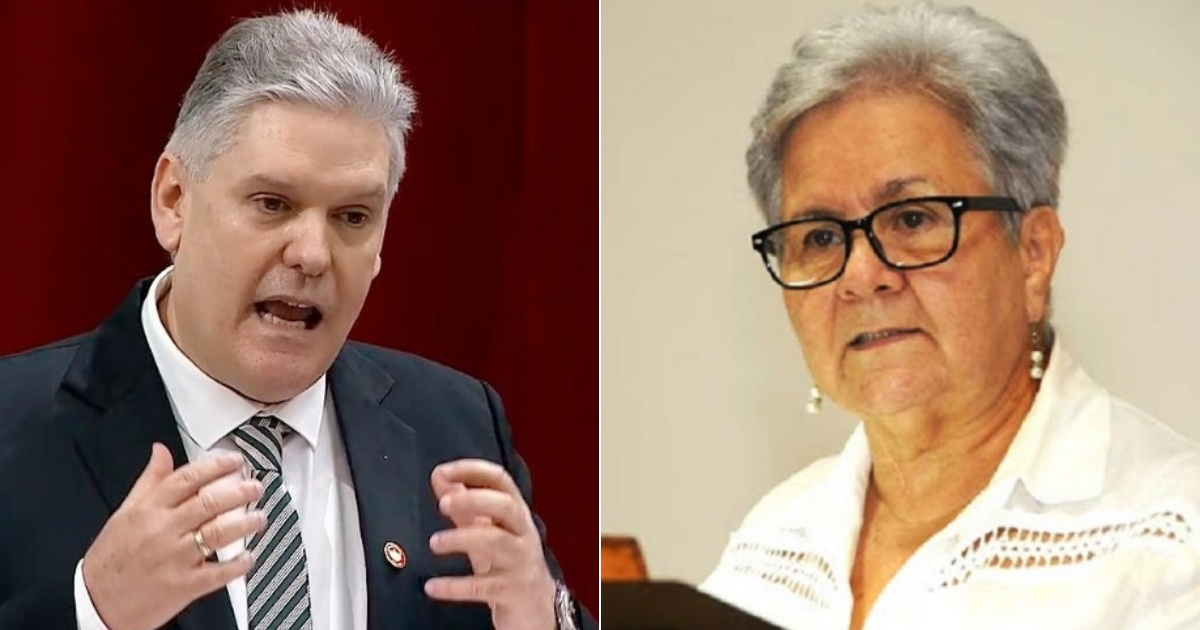
Related videos:
For the first time since it was made public in March that the former Minister of Economy of Cuba, Alejandro Gil, was being investigated for alleged corruption charges, a high-ranking official from the country has publicly addressed the issue.
The responsibility has fallen on Gladys María Bejerano Portela, the Comptroller General of the Republic of Cuba, who is the highest auditor of ministries and enterprises in the country.
Bejerano Portela, 77 years old and who served as vice president of the Council of State from 2009 to 2019, has unequivocally described what happened as a "betrayal" in an interview with the Efe agency, while also pointing out that corruption doesn't happen "out of nowhere"; rather, it is clearly a process of decay.
Gladys Mariela Bejerano, who has been at the helm of the General Comptroller's Office for 15 years and auditing for 20, advocates for drawing "lessons" from this "tragically negative experience."
Without directly mentioning the name of the ousted minister, Gladys María Bejerano admitted that "it hurts a lot."
"It hurts, it hurts a lot because as a colleague— as a Cuban— you think that someone who has been at that level, who has been managing the situations and the sacrifices that have had to be made, should have an attitude that reflects that. Honestly, it feels like a betrayal, like something that isn't right," he pointed out.
Immediately afterward, the leader recovered from the shock and claimed that beyond the surprise, "there is strength and courage to face" this difficult situation.
"Every time there has been an event, it has been made public. I can assure you of that," said the member of the Central Committee of the Communist Party of Cuba (PCC), confident that "sooner or later, and to the extent that it is objective," all the information will be provided.
He emphasized that the Cuban government does not downplay corruption "whether it comes from the bottom or the top," although he understands that this particular case has "greater significance." He also clarified that the investigation into Gil Fernández did not originate from the General Audit Office, although he did not specify the source.
Corruption in Cuba
Bejerano Portela acknowledged that times of scarcity and crisis give rise to illegal activities, and he criticized those who take advantage of such situations, even "cruelly."
"People do not fall into corruption like a parachute; it is a process. Corruption is decay; it is a process of losing values, self-esteem, and self-respect, and that progressively leads one down that path," the official added in statements to journalist Juan Palop for Efe.
Gladys Mariela Bejerano asserted that some corrupt individuals are so "out of self-sufficiency, vanity, and arrogance," and emphasized that neither state officials nor private individuals will be allowed to commit such crimes. She should have also pointed out that this applies to leaders as well.
He indicated that 76% of the illegal activities detected in Cuba occur "at the grassroots level" and that his "battle" is to reduce them to "zero" for reasons of "principles" and "convictions" of the revolution.
Bejerano acknowledged that 23% of the country's control systems have deficiencies, mainly due to a lack of technical or human resources. One example is that only 60% of the positions at the General Comptroller's Office are filled.
"The controls are not up to the level" that the Comptroller desires and that the country, the Government, and the PCC need, he acknowledged.
"We want honest, hardworking individuals to be able to run their businesses legally, fulfilling their obligations to the tax authorities and to society," he concluded.
Gaesa is not under your supervision
Gladys Mariela Bejerano noted that the business conglomerate GAESA, associated with the Revolutionary Armed Forces (FAR), is not under her supervision, but she justified this situation.
The group, which includes telecommunications, nearly the entire tourism sector, remittances, importing and distributing firms, banks, gas stations, real estate agencies, and other businesses, represents the main contribution to the gross domestic product (GDP).
However, the official argued that GAESA has “superior discipline and organization” due to its decades of business experience, and that the Comptroller's Office focuses its efforts where there is a need for “progress.”
Regarding the link between corruption and the growing inequalities in the country, Bejerano associated it with the emergence of the private sector. He noted that some individuals have more because they work and achieve results, but he also believes there are “illegities.”
Filed under: